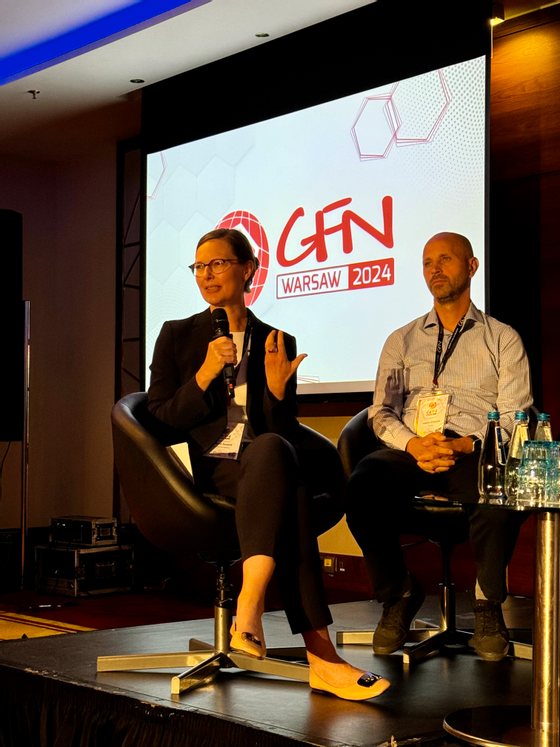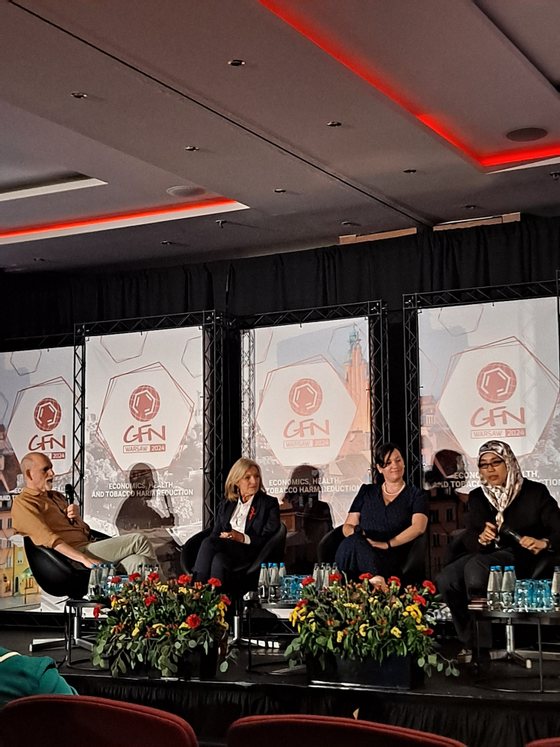Better public health policies and the urgent need to combat misinformation were cross-cutting ideas defended by more than 50 international experts gathered in Warsaw, at the Global Nicotine Forum 2024 (GFN24), with the theme “Health and economic benefits.” by reducing harmful substances.” effects of tobacco.
In its 11th edition, the event, one of the largest in the world on these topics, had as its main objective to debate and share knowledge about technological advances in the use of nicotine products and the opportunities they create for conventional tobacco smokers. , helping, for example, to abandon traditional cigarettes.
Elaine Round, who leads the Life Sciences Group at British American Tobacco (BAT), highlights, in statements to Observador Lab, that “there are currently one billion smokers around the world and it is essential to offer alternatives with less risks.” . “Vaping products, nicotine pouches and heated products have a much lower risk of toxicity and science shows they are better options.”

Conventional tobacco is a “serious epidemic,” considers Andrzej Fal, head of the Department of Allergies, Lung Diseases and Internal Diseases at the National Institute of Medicine in Warsaw, who agrees with the need to invest in alternatives and comprehensive public health policies to combat Effectively combat this “silent killer”.
Tikki Pangestu, visiting professor at the National University of Singapore and former director of Research and Cooperation Policies at the World Health Organization, recalls, in statements to Observador Lab, that “reducing damage to public health is very important, because there are “There are many smokers in the world and around eight million people die every year.” And he adds: “Quitting smoking is very difficult for most people and that is why the reduction of harmful effects allows them to have access to nicotine without harm, since the problem lies in the other substances related to the combustion of the cigarette. ”. The expert also highlights that, from a public health perspective, this vision is very important, because the costs of treating diseases related to conventional tobacco are very high.
“Smoking is deadly. Electronic cigarettes are not deadly. “It’s been more than 20 years and we don’t see these losses,” argues Garrett McGovern, addiction specialist and medical director of Priority Medical Clinic, in Dublin, Ireland. “What happens is that incorrect information is transmitted to the public and many people continue to believe that electronic cigarettes are as negative as traditional cigarettes. “This idea is completely wrong: e-cigarettes are 90% less harmful and have been shown to help people quit smoking.” For Tikki Pangestu, this is a difficult concept to convey, because people tend to see “reality in black and white” in a fallacious way and are influenced by inaccurate information transmitted on social networks. The culture war sweeping the Internet deepens divisions and provokes extremist reactions. “One of the strategies of the culture wars is to create polarization. Divide people, and this is also a political strategy, which facilitates doubt, creates fear and fosters anger against those who have a different point of view,” warns Professor Marewa Glover, of the Center of Research Excellence: Indigenous Sovereignty and Tobacco, from New Zealand.
Evidence from science: replicability is the foundation
Today, science can often be the subject of mistrust, with citizens questioning conclusions and forming their own ideas, often based on misinformation. The answer to greater solidity in scientific studies is through replicability, clarification of methodologies and transparency in details, experts warn.
The leader of the BAT life sciences research group, Elaine Round, highlights that the most important thing is to “work hard to guarantee rigor, according to international parameters, and respect the criteria of good clinical and laboratory practices.” .” Robert Sussman, from the National University of Mexico, adds on the topic of the credibility of science: “This is the question I ask people who question the industry. Why don’t they replicate? [estes estudos]? I am a scientist and I have replicated astrophysics and cosmology studies, because the results were erroneous or questionable, and I replicated them. I proved them invalid and many of my posts are like that. Therefore, I ask people who work in the field of tobacco control, if they do not trust the industry, to reproduce the results. Otherwise, it is nothing more than rhetoric.”

The expectation is that scientific studies can be credible and useful to society and smokers. “We need to have hope, we are looking at many problems around the world and many people are working hard to solve the problems related to smoking, we have to remain positive and work together,” says Australian doctor Alex Wodak. .
But will it be possible to put an end to smokers and tobacco?
The British Clives Bates, a public health consultant who, throughout his career, has participated in campaigns to reduce the harmful effects of tobacco, considers the idea an impossibility. Therefore, the important thing is to minimize the risks in regulatory terms, taking into account reality and not imponderable hypotheses. The same question was posed by Konstantino Farsalinos, who represents the universities of Patras and West Attica in Greece: “Can a nicotine-free society exist?” The professor is incredulous, as are many of those present. “I don’t remember any culture in the history of homosapiens that does not have things to smoke and drink with alcohol,” Dr. Andrzej Fal also emphasizes. Experts agree that the important thing is to look for realistic goals and solutions, with different regulations according to the different realities of each country. “Before discussing how to regulate things, it is important to define the objective of regulation. In my opinion, in the case of reducing the harmful effects of tobacco, the reason and objective of regulation is to help consumers make informed decisions,” says Farsalinos.
Fiona Patten from Australia, who says she is proud of the reduction in the harmful effects of tobacco in this country, believes that to improve the harm caused by tobacco, the best way is education. In countries with a large majority of vulnerable populations, education about the risks of tobacco and reducing its harmful effects is even more complex. As exemplified by Alla Sessanova, coordinator of the Council of Feminist Experts of the Eurason Network of People Who Use Drugs, reducing the harmful effects of tobacco in countries like Kyrgyzstan is even more difficult. “A third of the population is below the poverty line. “If people are worried about how they are going to feed their children, how are we going to convince them to take care of their health?” The problem of oversight persists in this region, as Jarkyn Shadymanova, associate professor at the American University of Central Asia, warned. “No one supervises production, no one can be sure what the product contains. We would like to have a regulation like that of Switzerland,” which has one of the lowest rates of smoking and oral cancer. Also for Sharifa Ezat Wan Puteh, from Malaysia, the black market is one of the biggest global problems that harms the fight against smoking. The lack of regulation facilitates unsafe alternatives that are sold without any control.
At the end of the three-day congress, international experts agree that “it is necessary to have hope”, as stated by Australian doctor Alex Wodak, highlighting that “many people work hard to solve the problems related to smoking”, and “we have to continue to be positive and work together” to minimize the harmful effects of tobacco on the five continents of the world.
Source: Observadora
